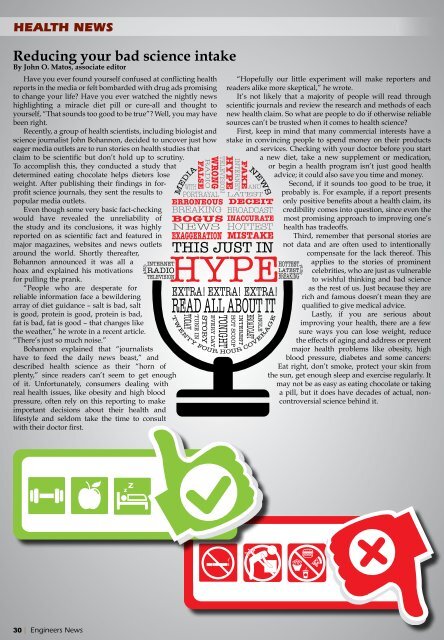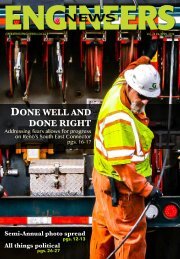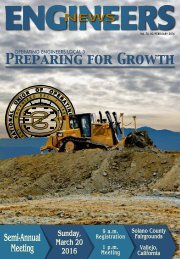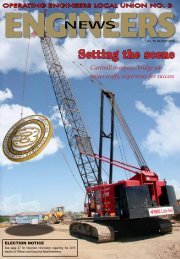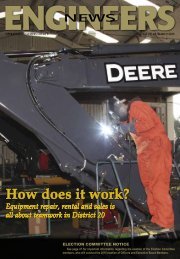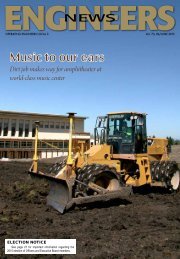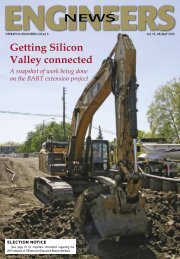Engineers News - October 2015
October’s edition offers many important updates, including the details of the new Master Agreement for Testing and Inspection, the Retiree Association Meetings schedule and some upcoming trainings in Utah District 12. You can also read all about how our members are faring as the fires rage on in Northern California. We have also included a Semi-Annual photo spread (more of these photos are available here), as well as the usual work-picture coverage in our District Reports.
October’s edition offers many important updates, including the details of the new Master Agreement for Testing and Inspection, the Retiree Association Meetings schedule and some upcoming trainings in Utah District 12. You can also read all about how our members are faring as the fires rage on in Northern California. We have also included a Semi-Annual photo spread (more of these photos are available here), as well as the usual work-picture coverage in our District Reports.
- No tags were found...
You also want an ePaper? Increase the reach of your titles
YUMPU automatically turns print PDFs into web optimized ePapers that Google loves.
Health <strong>News</strong><br />
Reducing your bad science intake<br />
By John O. Matos, associate editor<br />
Have you ever found yourself confused at conflicting health<br />
reports in the media or felt bombarded with drug ads promising<br />
to change your life? Have you ever watched the nightly news<br />
highlighting a miracle diet pill or cure-all and thought to<br />
yourself, “That sounds too good to be true”? Well, you may have<br />
been right.<br />
Recently, a group of health scientists, including biologist and<br />
science journalist John Bohannon, decided to uncover just how<br />
eager media outlets are to run stories on health studies that<br />
claim to be scientific but don’t hold up to scrutiny.<br />
To accomplish this, they conducted a study that<br />
determined eating chocolate helps dieters lose<br />
weight. After publishing their findings in forprofit<br />
science journals, they sent the results to<br />
popular media outlets.<br />
Even though some very basic fact-checking<br />
would have revealed the unreliability of<br />
the study and its conclusions, it was highly<br />
reported on as scientific fact and featured in<br />
major magazines, websites and news outlets<br />
around the world. Shortly thereafter,<br />
Bohannon announced it was all a<br />
hoax and explained his motivations<br />
for pulling the prank.<br />
“People who are desperate for<br />
reliable information face a bewildering<br />
array of diet guidance – salt is bad, salt<br />
is good, protein is good, protein is bad,<br />
fat is bad, fat is good – that changes like<br />
the weather,” he wrote in a recent article.<br />
“There’s just so much noise.”<br />
Bohannon explained that “journalists<br />
have to feed the daily news beast,” and<br />
described health science as their “horn of<br />
plenty,” since readers can’t seem to get enough<br />
of it. Unfortunately, consumers dealing with<br />
real health issues, like obesity and high blood<br />
pressure, often rely on this reporting to make<br />
important decisions about their health and<br />
lifestyle and seldom take the time to consult<br />
with their doctor first.<br />
WITH<br />
FALSE<br />
RADIO<br />
TELEVISION<br />
WRONG<br />
PORTRAYAL<br />
“Hopefully our little experiment will make reporters and<br />
readers alike more skeptical,” he wrote.<br />
It’s not likely that a majority of people will read through<br />
scientific journals and review the research and methods of each<br />
new health claim. So what are people to do if otherwise reliable<br />
sources can’t be trusted when it comes to health science?<br />
First, keep in mind that many commercial interests have a<br />
stake in convincing people to spend money on their products<br />
and services. Checking with your doctor before you start<br />
HYPE<br />
INTERNET<br />
FAKE<br />
AND<br />
LATEST<br />
DECEIT<br />
BROADCAST<br />
INACCURATE<br />
HOTTEST<br />
ERRONEOUS<br />
BREAKING<br />
BOGUS<br />
NEWS<br />
EXAGGERATION MISTAKE<br />
THIS JUST IN<br />
HYPE<br />
INTERNET<br />
RADIO<br />
TELEVISION<br />
EXTRA! EXTRA! EXTRA!<br />
READ ALL ABOUT IT<br />
TODAY<br />
EVERY DAY<br />
STORY<br />
TUNE IN<br />
TONIGHT<br />
INTEREST<br />
HOT SCOOP<br />
ANGLE<br />
BROADCAST<br />
a new diet, take a new supplement or medication,<br />
or begin a health program isn’t just good health<br />
advice; it could also save you time and money.<br />
Second, if it sounds too good to be true, it<br />
probably is. For example, if a report presents<br />
only positive benefits about a health claim, its<br />
credibility comes into question, since even the<br />
most promising approach to improving one’s<br />
health has tradeoffs.<br />
Third, remember that personal stories are<br />
not data and are often used to intentionally<br />
compensate for the lack thereof. This<br />
applies to the stories of prominent<br />
celebrities, who are just as vulnerable<br />
to wishful thinking and bad science<br />
as the rest of us. Just because they are<br />
rich and famous doesn’t mean they are<br />
qualified to give medical advice.<br />
Lastly, if you are serious about<br />
improving your health, there are a few<br />
sure ways you can lose weight, reduce<br />
the effects of aging and address or prevent<br />
major health problems like obesity, high<br />
blood pressure, diabetes and some cancers:<br />
HOTTEST<br />
LATEST<br />
BREAKING<br />
Eat right, don’t smoke, protect your skin from<br />
the sun, get enough sleep and exercise regularly. It<br />
may not be as easy as eating chocolate or taking<br />
a pill, but it does have decades of actual, noncontroversial<br />
science behind it.<br />
30 | <strong>Engineers</strong> <strong>News</strong>


